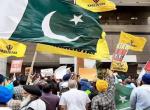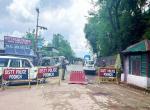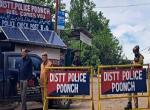Living with challenges has become a norm for the Islamic Republic of Iran. After the 1979 Islamic Revolution, it witnessed some mega problems, including eight-year war with Iraq, controversial nuclear programme, international sanctions, etc.
Currently, the emergence of Daesh, the Sunni terror organisation, in the immediate backyard, is very worrisome. Daesh’s quick advancements, in terms of territorial expansion in Iraq during mid-2014, caused a considerable alarm, and remain true till today. More than the activities inside Syria, the onslaughts unleashed by this outfit in its neighbourhood pushed it to intervene, but indirectly.
Daesh in Iraq is a Concern for Iran
Iran gave a lukewarm response to Daesh’s emergence in Iraq and Syria during the early days into its inception. As it happened with the international community, the capability of this outfit to create chaos and capture territories at a breakneck speed was not fully comprehended by Iran, too. It was only after a ‘blitzkrieg’ sort of territorial gain between 4 and 10 June 2014, it began to press the panic button. The decisive triumph over the Iraqi army, which led to the fall of Mosul and Tikrit, reinforced the fear in Tehran. Since then, Daesh’s rising prominence in Iraq has been taken as a serious threat. There are a few factors why such developments in Iraq have become a headache, and are highlighted below.
Despite their rivalries for most of the period during the 1980s, there has been a significant bonhomie between Iran and Iraq. As observed by a few, “Iraq holds an important place in Iran’s revolutionary religious narrative and strategy”.1 The presence of a large Shia population in Iraq is an important factor which brought them together. With approximately 65 percent of the total Iraqi population being Shia,2 the strategic value of this country to Iran increased. Most of the Persian Gulf countries are predominantly Sunni, which, to an extent, have aligned with Saudi Arabia. The deterioration of relations with a few of them and with the rise of Daesh, Iran sees the developments inside Iraq with extreme caution. Apart from this demographic factor, the religious dimension has its relevance. Home to the two most important holy sites for the Shia sect-- Najaf and Karbala-- the importance of Iraq remains preserved. Due to this, Iran makes efforts to build strong ties with the religious community in Iraq. For little more than a decade, it invested considerable financial, political and military resources to rebuild Iraq from the ravage caused by the United States invasion in 2003. With a motive to establish strategic partnership, “The so-called Shiite crescent—stretching from Iran to Iraq, Lebanon and Syria—was forged largely as a result of this effort.”3 This led to the expansion of economic cooperation between Iran and Iraq, and the growth of political ties under their leaderships. These developments had cemented their overall ties and, Iraq has become a “strategic asset for Iran.”4 The announcement of a Caliphate by Abu Bakr al-Baghdadi on 29 June 2014, therefore, was nothing but an adversary getting closer to the Iranian soil. The presence of a resolute organisation, with pernicious ideology and extremely sectarian, in its backyard led to the reorientation of Iran's policies vis-a-vis Daesh. This resulted into an indirect involvement in the fight against the outfit Inside Iraq.
Military-Security Measures
The Iranian government underplays its military assistance to Baghdad. But as a move to safeguard its strategic and regional interests, Iran, however, sent the commander of its elite Quds force General Qassem Suleimani to Baghdad during mid-June 2014.5 Despite the initial denials about deployment of military personnel, approximately 2,000 Iranian troops reportedly arrived in Baghdad to oversee the protection of the capital city. This happened at a time when the United States (US) began to consider the possibility of air strikes against the outfit. President Hassan Rouhani even raised the prospect of cooperating with Washington D.C.,6 but this did not happen so far.
Iran’s military-oriented assistance to contain Daesh was triggered by its regional concerns. The possible disintegration of Iraq under the hands of highly motivated Sunni fighters would be an unimaginable eventuality for Tehran; as a result “all Iranian support to groups in Iraq would be given within the framework of the country’s territorial integrity.” 7 Fragmentation of Iraq on sectarian lines would also come as a serious blow as that would reduce Iran’s influence in the region. Given the increasing frictions, particularly with Saudi Arabia, in their quest for regional supremacy, establishment of a Sunni-dominated entity is undesirable to Iran. Therefore, Tehran’s Iraqi policy is centred on the prevention of territorial split by destroying the capabilities of Daesh to take more territories under its control. This led to the decision to arm the Iraqi Shiite and Kurdish militias as its “proxies”, in Syria as well.8 Iran’s supply of weapons and ammunition to Iraqi Kurdish forces was disclosed by Kurdistan President Massoud Barzani during his meeting with the Iranian Foreign Minister Javad Zarif in Erbil (capital of Iraq’s Kurdish region) in August 2014.9 The arming of Kurdish peshmerga by Iran and the US put them on the same side but did result into cooperation. This indirect assistance, simultaneously, is a risky business as other surrogates, namely, Kurdistan Worker’ Party (PKK) and its Syrian affiliate, the Democratic Union Party (PYD), have their own political agenda or aspirations to break away from the Iraqi central government. 10
Alongside the backing of militias, Iran reportedly delivered military items to Baghdad. For instance, during late February 2014, they signed an arms deal worth US$195 million to supply light and medium arms, mortar launchers, ammunition for tanks, artillery and mortars, night vision goggles, communications equipment and mortar-guiding devices. 11 Since this was clinched during the period of sanctions, it remained uncertain whether the items were delivered or not. But Iranian military transport aircrafts reportedly sent military equipments and supplies to Baghdad (twice daily) during mid-June 2014, and set up special control centre to monitor surveillance drones over Baghdad.12 In early-July, Iran reportedly delivered three Russian-made Su-25 jets to Iraqi government to be deployed against the Sunni outfit.13 Larger platforms such as M-60 tanks were reportedly to have been sent to northern Iraq in August. Without its participation in the US-led coalition air campaign, Iran, with a request from Baghdad, conducted air strikes against Daesh militants in eastern Iraq in December 2014.14 This indicated that Iran and the US has not seen eye-to-eye on this issue despite considering this outfit as a common enemy. During 2015, Iran continued to provide military assistance to the Shiite militias and the Iraqi government. For instance, in October 2015, the militias backed and trained by Iran played a pivotal role in retaking Baiji oil refinery which was captured by Daesh during mid-June 2014. However, the gradually-rising Iranian influence in Iraq, by providing logistical supports, was not viewed on a good light by some of the Kurds (in Erbil). Riyadh is undoubtedly perturbed with the tacit Iranian activities in its backyard, including Yemen. It is likely that Iran’s military assistance will continue as and when the outfit escalates its operations inside Iraq.
Coordinated Efforts: The Problem
Despite Iran’s coordination with Syrian and Russian forces, a similar arrangement with the US and Saudi Arabia is yet to be a reality. As it is, in September 2014, the Supreme Leader Ayatollah Ali Khamenei criticised the US-led military campaign and considered it as “hollow and biased”.15 A similar policy was adopted during 2015 when Iranian officials ruled out joint-action with the US. The deep-rooted mistrust between these once-allies continues to be the roadblock and mars the prospects for a consensus. However, the initiative of the French President Francois Hollande following the November-2015 Paris attack raised the possibility of Iran’s inclusion in the coalition campaign but that has not seen any result. Thereafter, hopes sprung up when Tehran called for “concerted international effort [including US and Britain] to beat ISIS and end Syrian war” in a meeting at the United Nations Security Council in December 2015.16 This effort looked applicable mainly for the Syrian crisis as loopholes still exist in the overall anti-Daesh strategy. The deterioration of relations between Iran and a few Arab countries following Saudi’s execution of a Shia cleric Nimr al-Nimr in early January this year is definitely an inevitable obstacle. This will likely extrapolate the rapidly-developing tension between Tehran and Riyadh, which are equally vying for influence in West Asia. Under such geopolitical developments, a robust regional cooperation looks difficult. Moreover, the diminishing role of the US, after five-odd decades of dominance, has created an opening for power such as Russia, which is also increasingly at odds with Turkey. As opined by scholar like P.R. Kumaraswamy, “For a lasting stability in the Middle East needs a grand bargain where principle stakeholders especially Russia, the US, Iran and Saudi Arabia adopt give-and-take positions and accommodate the concerns and fears of their rivals.”17 Unless these stakeholders shed their political, ideological and strategic baggage, the effort to tackle Daesh or to combat extremism in the region is far from reality.
Conclusion
Iran’s concerns with the presence of Daesh militias across the border will remain until the outfit’s expansionist vigour and military capabilities are significantly destroyed. However, due to the lack of coordination with the Western countries, its intervention, particularly in Iraq, is going to be a limited one. It is, therefore, yet to be seen how far the arming of Shiite and Kurdish militias will play out in the long run, though it resisted the outfit’s movements. At this juncture, it is still unclear as to what kind of common understanding will narrow down the differences that exist between the countries with vested interests. This is a serious gap in the overall strategy, and not only for Iran.
Endnotes
- Dina Esfandiary and Ariane Tabatabai (2015), “Iran’s ISIS Policy”, International Affairs, 91 (1), p. 3.
- “Iraq Population 2016”, World Population Review, http://worldpopulationreview.com/countries/iraq-population/
- Farnaz Fassihi, “Iran Deploys Forces to Fight al Qaeda-Inspired Militants in Iraq”, The Wall Street Journal, 12 June 2014, http://www.wsj.com/articles/iran-deploys-forces-to-fight-al-qaeda-inspired-militants-in-iraq-iranian-security-sources-1402592470
- Esfandiary and Tabatabai (2015), “Iran’s ISIS Policy”, p. 3.
- “Iraq crisis: Iran and US join fight against Sunni jihadis of Isis”, The Guardian, 14 June 2014.
- Martin Chulov, “Iran sends troops into Iraq to aid fight against Isis militants”, The Guardian, 14 June 2014.
- Esfandiary and Tabatabai (2015), “Iran’s ISIS Policy”, p. 7.
- “The Growing Power Of Iranian Proxy Militias In Iraq And Syria Poses Problems For The US”, Business Insider, 8 September 2014.
- “Iran provided weapons to Iraqi Kurds; Baghdad bomb kills 12”, Reuters, 26 August 2014.
- Esfandiary and Tabatabai (2015), “Iran’s ISIS Policy”, p. 7.
- Ahmed Rasheed, “Exclusive: Iraq signs deal to buy arms, ammunition from Iran – documents”, Reuters, 24 February 2014.
- Michael R. Gordon and Eric Schmitt, “Iran Secretly Sending Drones and Supplies Into Iraq, U.S. Officials Say”, The New York Times, 25 June 2014, http://www.nytimes.com/2014/06/26/world/middleeast/iran-iraq.html
- Michael R. Gordon and Eric Schmitt, “Iran Sends 3 Attack Planes to Iraqi Government”, The New York Times, 8 July 2014.
- Julian Borger, “Iran air strikes against Isis requested by Iraqi government, says Tehran”, The Guardian, 6 December 2014.
- “Supreme Leader: ISIL Backbone Broken by Iraqi People, Army Not By US”, FARS News Agency, 15 September 2014.
- Simon Tisdall, “Iran calls for concerted international effort to beat Isis and end Syrian war”, The Guardian, 18 December 205.
- P.R. Kumaraswamy, “Middle East: Insane to be an Optimist?”, Valdai, Valdai Discussion Club, 17 February 2016.
Published Date: 30th March 2016, Image Source: http://www.newsmax.com
(Disclaimer: The views and opinions expressed in this article are those of the author and do not necessarily reflect the official policy or position of the Vivekananda International Foundation)










Post new comment